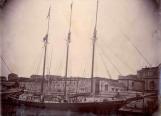27
In the spring of 1928, Sir Richard Squires, having been cleared of all wrong doing (except for a fine of $1000 for tax evasion), announced his return to politics. His supporters in government formed a new party and Bradley was their chief spokesman. Bradley had now gained a reputation as a champion of the working class and in the next election he won by a landslide in the district of Trinity Centre. In the new Liberal party he took up an important cabinet position. He held high positions in several government committees and was a director of the Newfoundland Railway.29
His work in government, which mostly concerned legal matters, did not capture the attention of the public so much as when he bought a small part of Government house land to widen his driveway. Apparently he was an avid motorist.31
Then came the 1930's and the great depression. This was not a good time to be a politician. Newfoundland being so dependent on exports was hit especially hard. Unemployment and poverty bred social unrest. The countries' financial situation was desperate and the government bore the brunt of blame. Bradley advocated defaulting on the national debt. This was a viable option taken by several other countries at that time whose situation was most similar to that of Newfoundlands.Sir Richard could not be convinced.
33
On April 4, 1932, while Government was in session, a large crowd marched on the Colonial Building. It turned into a riot. The building received extensive damage. Bradley and other government members, including the Prime Minister Sir Richard Squires, were trapped inside during the attack. Later Bradley blamed some local businessmen for inciting the violence.35
Just over a week later the Liberals called an election. Once again charges of corruption were brought against Sir Richard Squires. The opposition, led by F.C. Alderdice, won a landslide victory.37
F. Gordon Bradley and Roland Sparks were the only government members to be reelected. The conservative party now called the United Newfoundland Party, formally the Liberal-Conservative Party which was formally the Liberal-Labour-Progressive Party, took power. Apparently it was not a good time to be associated with anything Liberal.Bradley became the leader of the tiny opposition party in what was to be the last National Government of the Dominion of Newfoundland.
The new government under Prime Minister F.C. Alderdice found itself in the same position as the old Squires government. The country was virtually bankrupt and in the face of a world wide economic depression there was not much it could do. Unemployment and poverty were rampant. The government could only reduce spending and cut services. This didn't go over very well at all. Social unrest was growing and riots were starting to break out again. The government decided it's only option was a partial default on the national debt as Bradley had proposed to his old boss, Sir Richard Squires. The threat was enough. Canada and England stepped in to help out Newfoundland with its debt payments, but there was a catch. A royal commission would examine the political and financial situation in Newfoundland and make recommendations. The members of the commission would be appointed by Canada and England as well as Newfoundland. It would come to be known as the Amulree Commission and for the Dominion of Newfoundland it was the beginning of the end.
38
During this troubling time Bradley found himself thrust to the forefront of Newfoundland politics as a lone voice speaking out for the working man. The Merchant and professional elite in St. John's suffered minor discomfort while hunger and destitution ravaged the outports. Infant mortality increased, nutritional diseases such as rickets and scurvy were common. The gap between rich and poor broadened." If we continue squeezing the people in order to liquidate our bondholders, what will our people live on?......You can't kill the people in the interest of the bond holders"
F. Gordon Bradley, 1933
40
He criticized the Alderdice Government for playing politics to defeat the Squires Government rather than supporting it in the face of an international crisis that was the Great Depression. He accused them of fermenting riots and misleading the people. He spoke of "the insane incompetence" of the fish exporters.‘The profits of the industry should go to the producer. The producer in Newfoundland is the fisherman and therefore the profits of that production should go to the fisherman. He is the one who in the past has seldom if ever got any of the profits... He was given a bare crust of bread while the Water Street merchant pilfered the jam. It is time we took the jam pot away from them... My plea today is for action- action on behalf of the populace. I am not usually of a gambling tendency, but the situation today is that Newfoundland has nothing to lose and everything to gain, and if I were Prime Minister I would risk everything to try and encourage the producers... with a view to bringing this country out of the condition she is now in, and to bring her back to prosperity once again. This is not the time for the playing of party politics. There will be lots of time for the playing of that game again...'
F. Gordon Bradley, 1933





